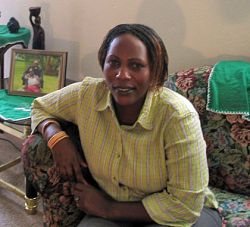Refugee Day brings memories to the surface

by Jessica Blake, intern Intermountain Catholic SALT LAKE CITY — Many Rwandans felt trapped, abused, or even terrified while their families, friends, and neighbors were being attacked. The Rwandan Civil War began in 1994. Rwanda is one of the poorest and most crowded countries in Africa. The only place the survivors could turn was refugee camps which would eventually relocate them to another country. On June 23, refugees from countries such as Rwanda and Somalia who now live in Utah gathered at Granite High School in Salt Lake City to celebrate their current freedoms. Jacqueline Mukasafuri, a refugee from Rwanda, arrived at Granite High School to honor her past and rejoice with other refugees. Jacqueline was born in 1974, in Rwanda. She had four brothers and three sisters. By age 12, she needed to decide what she wanted to do for the rest of her life. She wanted to be a judge, to make things somewhat right in the Rwandan government. She studied law from 1991-1998. During that time, however, the Rwandan Civil War began and bombs were being dropped. In 1994, her older brother, studying to be a secretary, her parents, and the rest of her siblings, all of which were under the age of 12, were killed. After surviving the war with no direct relatives, Jacqueline knew she needed to move. She decided to come to America, "People like to come to America, but it’s not easy to get here," said Jacqueline. After the one year struggle to migrate, she arrived in America in 2005. She soon found that the education she had completed in Rwanda could not transfer to the American judicial system. She needed to start over. Jacqueline came with her cousins but she now lives in a small community of refugees who help each other. "The community of friends help teach me English, writing, and help with my homework," says Jacqueline. "I had to learn English when I came to America, but it wasn’t easy. I watched the T.V. but they talked too fast, I couldn’t hear them." Jacqueline enjoys her present job as a substitute teacher for a day care. Jacqueline states that she has, "two goals, one to work with people, and the other to work with kids." Jacqueline states, "I need to be with kids." She wants to be a social worker, the education "looked like it would take two years but now it looks like it will take four years," said Jacqueline. Jacqueline’s story is one of many refugees who came from Rwanda. The Rwandan Civil War was a war between two tribes who have been rivals since the 15th century, but many refugees who have migrated are ready for peace. When the Tutsi tribe arrived and dominated the Rwandan government, Rwanda became isolated to outsiders until the 1890s. According to the book "Cultures of the World Rwanda," by David C. King, the Rwandan government had a system known as ubuhake. Ubuhake is a complex system in which the inferior received protection from the superior in exchange for services. Ubuhake is now thought to be the original cause of the Civil War. Even though the Tutsi tribe was ruling the government, they were a minority compared to the mass population of the Hutu tribe in Rwanda. In 1959, the Hutu battled the Tutsi and finally gained control of the government. On April 6, 1994, a private jet holding Juvenal Habyarimana, the president of Rwanda, Cyprien Ntaryamira, newly elected president of Burundi, and others was shot down. The assassin was never found. Decades of intricate ethnic, social, and political hatred had finally come crashing down. The government posted information stating Tutsi as the ‘enemy’. Government-backed Hutu extremists soon massacred the capital, Kigali, and Rwanda itself. In just four months 800,000 to 1,000,000 Tutsi and moderate Hutu were murdered. As the genocide continued, the United Nations (UN) did not want to intervene. They wanted the people of Rwanda to settle their own differences. Canada helped the UN establish a peace keeping force called UNAMIR (United Nations Assistance Mission for Rwanda). The UN Security Council would not send additional support and denied UNAMIR’s request to intervene. The genocide only ended when the Tutsi-dominated rebel group known as the Rwandan Patriotic Front overthrew the Hutu government. Now, refugees from Rwanda are found everywhere around the world. There were 30,000 to 50,000 refugees living in Utah in 2005. World Refugee Day was made to recognize the contributions of refugees throughout the world. All refugees need is an opportunity to make their lives better. Jacqueline is thankful that, "America gives everybody freedom to earn money."
© Copyright 2024 The Diocese of Salt Lake City. All rights reserved.

Stay Connected With Us